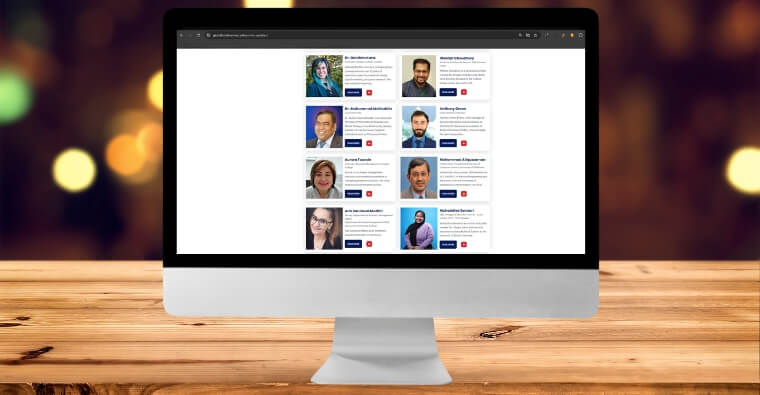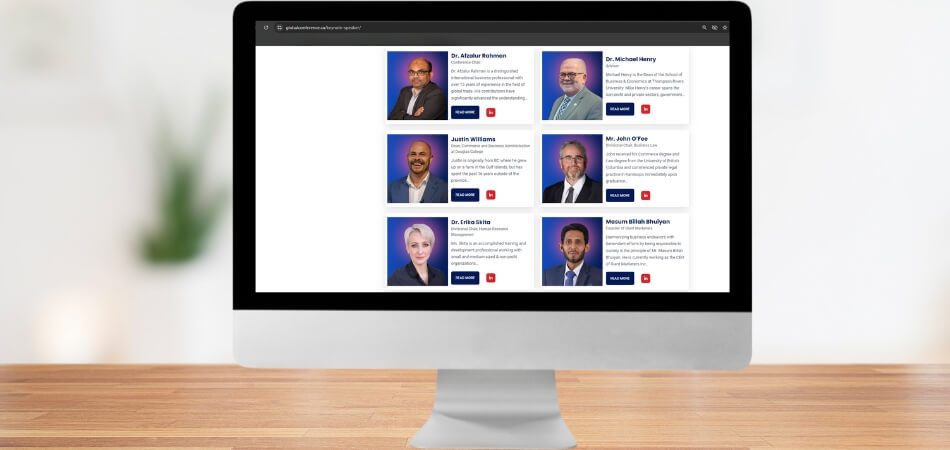Conferences are excellent places to learn, network, and grow your career. Among the many opportunities they offer, finding a business mentor can be one of the most rewarding. Mentors provide valuable guidance that can help shape your professional path and open doors to new possibilities.
But how do you find business mentors at conferences? It’s all about preparation, engaging with the right people, and building authentic connections. When done right, these mentor relationships can provide long-term support and advice that can truly impact your career.
Curious to know how to get started? Keep reading to learn practical steps for finding a business mentor at your next conference and building a lasting relationship.
Why Finding a Business Mentor at Conferences Matters?
Finding a business mentor at conferences can be invaluable for your professional growth. Conferences bring together experts from various fields, creating the perfect environment to connect with those who can guide you on your career journey. Here’s why it matters:
- Access to Expertise: A mentor has been through challenges you may be facing and can offer insights that help you avoid common mistakes, accelerating your growth.
- Personalized Guidance: Mentors provide tailored advice that addresses your unique career goals and circumstances, something general advice from workshops can’t offer.
- Networking Opportunities: Mentors often introduce you to their network, giving you access to key contacts who can further support your career. The networking benefits of business conferences allow you to meet multiple professionals at once, increasing your chances of finding a mentor.
- Career Motivation: A mentor keeps you motivated, pushing you to strive for greater achievements and helping you stay on track with your goals.
- Long-Term Relationship: Conferences are just the starting point. The connection you establish can grow into a lasting mentor-mentee relationship, continuing well beyond the event.
- Learning from Experience: Mentors share real-life experiences and lessons learned, offering a practical perspective that can be more valuable than theoretical knowledge.
Having a mentor in your corner helps you make informed decisions, stay motivated, and find new opportunities, making conferences a prime occasion to start building those relationships.
How to Find Business Mentors at Conferences?
Finding business mentors at conferences can be a game-changer for your career. However, getting around the networking landscape can feel overwhelming if you’re not prepared. The key to success is having a clear plan in mind and taking actionable steps to connect with the right people.
Here’s a step-by-step guide to help you find business mentors at conferences:
Step 1: Set Clear Goals
Before attending the conference, define what you want to achieve. Are you looking for advice in a specific area? Do you want someone with industry expertise or leadership experience? Knowing your goals will help you identify potential mentors who align with your professional development needs.
Step 2: Research the Speakers and Attendees
Many conferences provide a list of speakers and attendees in advance. Take the time to research their backgrounds and areas of expertise.
Focus on individuals who share your industry interests or have experience in areas where you seek guidance. Whether you’re attending international business conferences in Canada or local events, doing research beforehand helps you connect with specific people.
Step 3: Prepare an Elevator Pitch
You only have a few moments to make an impression, so create a concise elevator pitch. It should cover who you are, your career goals, and why you’re attending the conference. Having this ready makes it easier to introduce yourself confidently to potential mentors.
Step 4: Attend Networking Sessions
Most conferences offer dedicated networking opportunities like roundtable discussions or social events. These are perfect settings to meet potential mentors. Be proactive in attending these sessions, and don’t hesitate to introduce yourself to those who interest you.
Step 5: Start Meaningful Conversations
When engaging with potential mentors, focus on asking thoughtful questions about their experiences. Show genuine interest in their career journeys and listen actively. Meaningful conversations create a connection and make it easier to build a mentor-mentee relationship.
Step 6: Follow Up After the Conference
Following up is essential for maintaining the connection you made at the conference. Send a personalized message or email thanking the person for their time and insights. Mention something specific from your conversation to show you were attentive, and express interest in staying connected.
Step 7: Be Patient and Persistent
Mentor relationships don’t form overnight. Be patient and consistent in your follow-up. Over time, continue engaging with your potential mentor by sharing updates on your career or asking for occasional advice. Persistence helps build a lasting relationship.
By following these steps, you’ll increase your chances of finding the right mentor who can offer valuable guidance for your career. Building authentic connections at conferences is all about being intentional, engaged, and proactive. With the right approach, you’ll walk away with not just new contacts, but meaningful mentorship as well.
What Qualities Should You Look for in a Business Mentor?
Choosing the right business mentor is crucial for your professional growth. A mentor should not only have experience but also be someone you can connect with and learn from. Here are key qualities to look for when identifying a business mentor.
Relevant Experience
A mentor should have significant experience in your field or the area you want to grow in. Their expertise allows them to provide valuable insights that can help guide your career path and help you avoid common mistakes.
Good Communication Skills
A great mentor knows how to listen and communicate effectively. They should be able to explain complex concepts clearly and offer constructive feedback in a way that encourages your growth.
Approachability
A mentor should be approachable and open to sharing their knowledge. Look for someone who is willing to invest time in your development and who you feel comfortable asking questions or seeking advice from.
A Growth Mindset
An ideal mentor encourages continuous learning and development. They should push you to think outside the box, take on new challenges, and develop skills that will propel you forward in your career.
Empathy
Empathy is important in a mentoring relationship. A mentor who understands your struggles and goals will provide more personalized and meaningful advice. They should be able to put themselves in your shoes.
Consistency
A strong mentor-mentee relationship requires consistent engagement. Look for a mentor who is reliable, committed, and willing to check in regularly to track your progress.
Finding a mentor with these qualities ensures a more impactful and supportive relationship that will help guide your career to new heights.
How to Approach Potential Mentors at Conferences?
Approaching potential mentors at conferences can feel intimidating, but with the right approach, it can lead to meaningful connections. Here are a few actionable tips to make this process easier and more natural for you.
Be Prepared and Confident
Before attending the conference, do some research on the speakers or attendees. Know who aligns with your goals, and practice introducing yourself confidently. A well-prepared introduction sets a positive tone and helps you stand out.
Look for Natural Opportunities
Networking events, workshops, or casual gatherings during breaks are great moments to approach potential mentors. These settings are more relaxed, making it easier to strike up a conversation without feeling forced.
Start with a Friendly Conversation
Begin by asking open-ended questions about their experiences or insights on a topic. Showing genuine interest in their journey helps build rapport and makes the conversation flow naturally, rather than jumping straight into asking for mentorship.
Be Mindful of Their Time
Keep in mind that mentors are often busy people. Respect their time by keeping initial conversations short but meaningful. Mention how much you appreciate their work and ask if they’d be open to continuing the discussion later.
Exchange Contact Information
After a positive interaction, ask to exchange contact information. This ensures you can follow up later, building a relationship beyond the conference.
Approaching potential mentors with respect and authenticity is key. Be patient, and let the relationship develop over time. Each interaction is a step toward building a lasting connection.
Common Mistakes to Avoid When Seeking Mentors at Conferences
When seeking mentors at conferences, it’s important to avoid certain common mistakes that could hinder your chances of building a valuable relationship. By being aware of these mistakes, you can approach potential mentors with confidence and make meaningful connections. Here are some mistakes to watch out for.
Being Too Pushy
It’s great to be enthusiastic, but coming across as too aggressive can turn potential mentors away. Approach them with respect and give them space to engage in the conversation at their own pace.
Talking Only About Yourself
Focus on creating a dialogue rather than a monologue. Show genuine interest in your potential mentor’s experiences and insights, rather than making the conversation entirely about your career goals.
Not Doing Your Research
Don’t go into a conference blind. Research the speakers and attendees in advance so you know who aligns with your goals. Having prepared questions helps you approach the right people. Additionally, choosing sessions at business conferences that attract industry leaders is a great way to target key individuals you’d like to connect with.
Failing to Follow Up
Many attendees make initial connections but forget to follow up after the conference. Always send a personalized follow-up message within a few days to keep the connection fresh.
Expecting Instant Mentorship
Building a mentor-mentee relationship takes time. Don’t expect someone to become your mentor after a single conversation. Focus on nurturing the relationship gradually, and let it develop naturally.
By avoiding these common mistakes, you can improve your chances of finding the right mentor at conferences and build a relationship that is mutually beneficial.
How to Maintain a Lasting Mentor Relationship After the Conference?
Maintaining a lasting mentor relationship after the conference is just as important as making the initial connection. It requires consistent effort, clear communication, and mutual respect. Here are some key points to help you nurture and maintain a strong mentor relationship.
Follow Up Promptly
Send a thank-you email within 24 to 48 hours after the conference. Express your appreciation for the mentor’s time and insights. Mention specific topics from your conversation to show your genuine interest in staying connected.
Schedule Regular Check-Ins
Set up a recurring time to check in with your mentor, whether monthly or quarterly. These check-ins provide opportunities to discuss your progress, ask for advice, and keep the relationship strong.
Show Progress
Mentors like to see that their guidance is making an impact. Keep them updated on how their advice has helped you and what progress you’ve made. This will show your dedication and make the mentor feel valued.
Be Open to Feedback
A good mentor will offer constructive criticism. Be receptive and willing to make changes based on their feedback. It shows maturity and helps strengthen the relationship.
Offer Your Support
Mentorship should be a two-way street. If you come across useful information, share it with your mentor. Offer to help in areas where you have expertise, showing that you value the relationship beyond just receiving advice.
Stay Grateful
Continue expressing your appreciation for their time and support, even as the relationship grows. Small gestures of gratitude go a long way in maintaining a positive connection.
By following these steps, you can build a lasting mentor relationship that continues to benefit both you and your mentor long after the conference ends.
Frequently Asked Questions
Building a strong mentor relationship starts with asking the right questions. Whether you’re new to networking at conferences or looking to improve your approach, these frequently asked questions will help guide you in finding and connecting with the right business mentors at events.
Can You Find a Mentor at Any Conference?
Yes, but it depends on the type of conference and its attendees. Conferences focused on your industry or career goals increase your chances of meeting the right mentor. Look for events that attract experienced professionals who align with your interests.
Do I Need to Prepare Before Approaching a Mentor?
Absolutely! Preparation is key. Research potential mentors and prepare an elevator pitch that highlights your career goals and why you’re seeking guidance. This shows respect for their time and helps build a strong first impression.
How Soon Should I Follow Up With a Mentor After a Conference?
You should follow up within 24 to 48 hours after the meeting. A timely, personalized email expressing gratitude and referencing your conversation helps keep the connection fresh and shows that you are genuinely interested in maintaining the relationship.
Is It Okay to Ask Multiple People to Be Mentors at One Conference?
Yes, you can approach multiple potential mentors. However, make sure each mentoring relationship offers unique value and doesn’t become exhausting. It’s important to build genuine, manageable connections rather than quantity.
Do I Need to Keep in Contact Regularly After the Conference?
Yes, regular contact is essential for maintaining a mentorship relationship. Checking in periodically, sharing updates, and asking for advice keeps the relationship active. However, make sure you respect their time and don’t overwhelm them with too many messages.
Bottom Lines
Finding a business mentor at a conference can significantly impact your personal and professional growth. By being prepared, approachable, and intentional, you can form meaningful connections with potential mentors who are willing to guide you.
Wondering how to find business mentors at conferences? Start by engaging in genuine conversations, asking thoughtful questions, and following up after the event. These steps can help you build strong relationships that extend beyond the conference.
Take the next step in your career by using these strategies to connect with mentors at your next event. With the right approach, you can develop lasting mentor relationships that support your long-term success.








